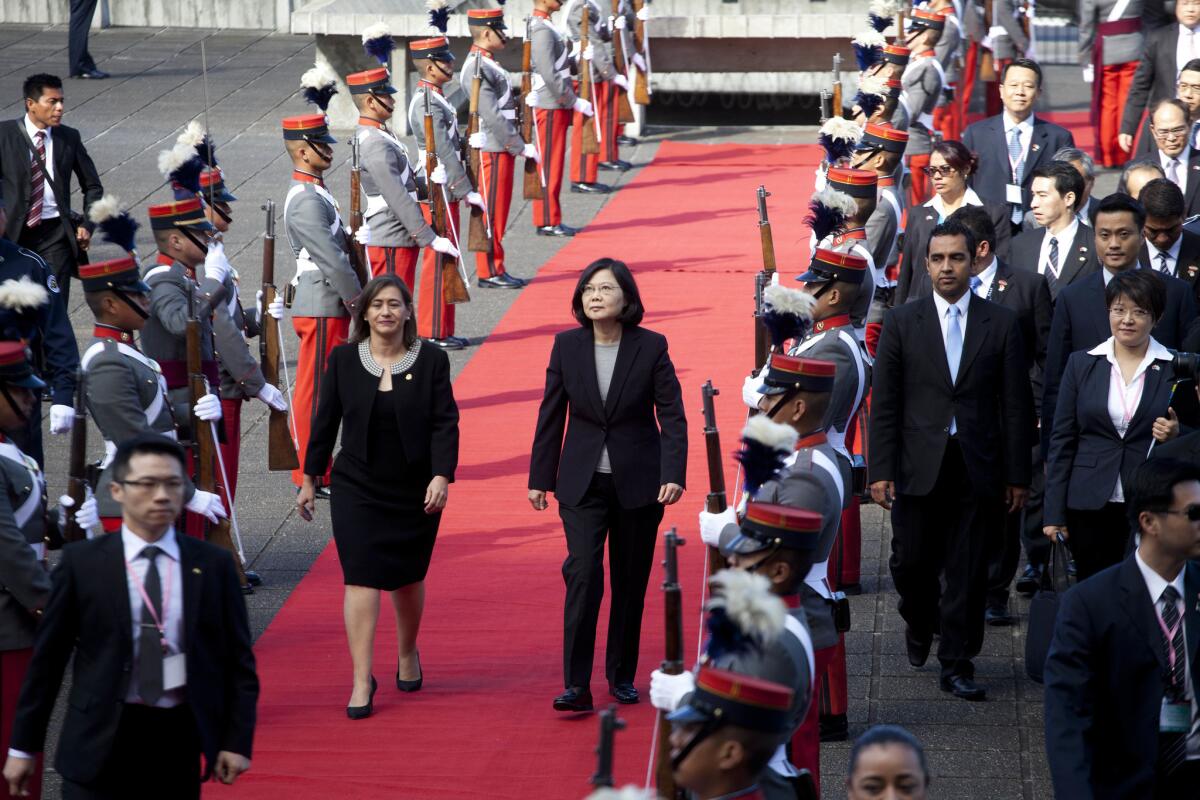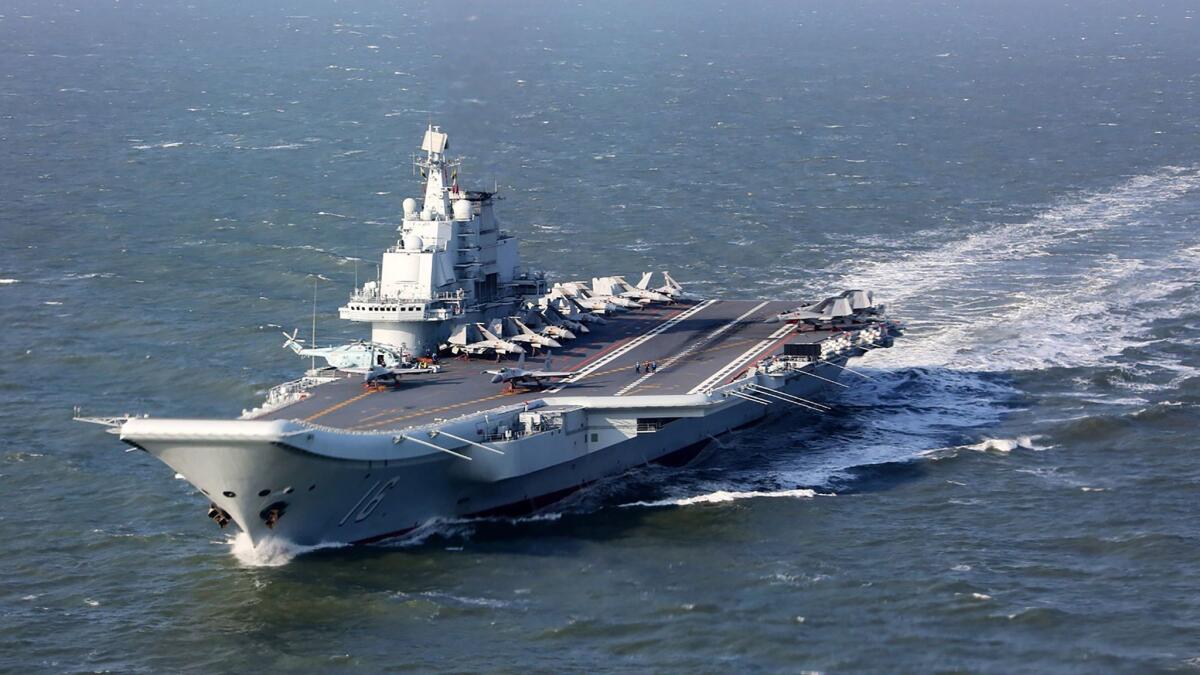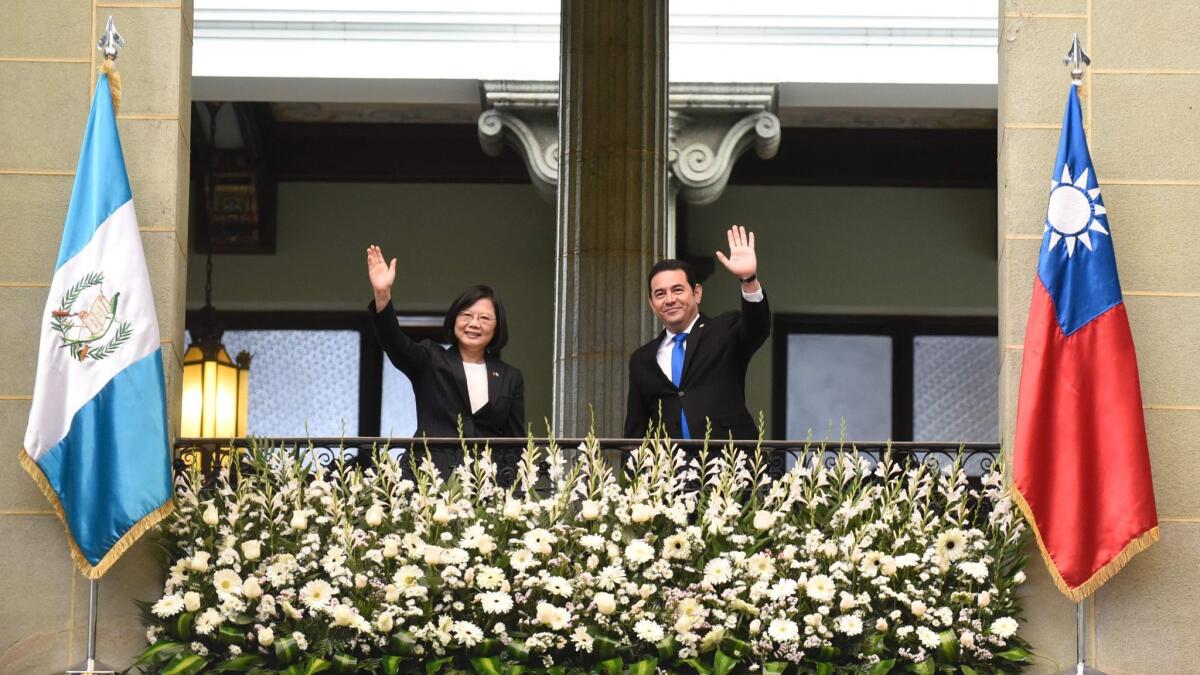China ups pressure as Taiwan president extends its reach in the Americas

- Share via
Reporting from Taipei, Taiwan — As a Chinese aircraft carrier floated ominously off her nation’s coast, Taiwan’s president short-hopped through the Americas this week, seeking to improve relations with the United States and Central America — while walking a fine line with Beijing.
Early indications are that Tsai Ing-wen’s trip was a success, solidifying ties with allies without angering China to the point of retaliation. Still, the trip was closely watched by Beijing, which had the the carrier pass off the Taiwanese coast as a warning and may have engineered a diplomatic shakeup on Thursday.
“So far she’s got better than a passing grade,” said Raymond Wu, managing director of the Taipei-based political risk consultancy e-telligence. “In a sense, she’s been able to complete the multiple purposes she had on the trip. The reception domestically should be largely positive.”
Many in Taiwan see the president’s journey as a pivot point in the isolated island’s ever-precarious diplomatic relations. With their economy depending on much of the world for trade, people here want stronger ties in the Americas, especially with the United States.
Tsai was due to stop in San Francisco on Friday on her way from Central America back to Taiwan. On her outbound leg last week, she stopped in Houston, where she talked to Texas Gov. Greg Abbott about trade, tourism and investment connections between his state and Taiwan.
China had asked Washington, which does not formally recognize Taiwan diplomatically, to block the stopovers, which are technically intended only to allow her to change planes.
While in Texas, the president also met with Republican Sen. Ted Cruz, despite pressure from China to avoid her. Cruz issued a statement saying that Beijing “needs to understand that in America we make decisions about meeting with visitors for ourselves.”
Cruz had previously said he supported Tsai’s Dec. 2 phone call with President-elect Donald Trump. The call, a first for U.S. and Taiwan leaders since the 1970s, sparked a strong protest from China and the initial appearance last month of its Liaoning aircraft carrier near Taiwan’s coast.

On Wednesday, China sent the carrier through the Taiwan Strait, a 100-mile-wide body of water that divides the island from China, and through Taiwan’s air defense identification zone, the Taiwanese defense ministry said as it tracked the movement with jets and navy frigates. Analysts in Taipei saw the carrier’s passage as a warning.
China has seen staunchly self-ruled Taiwan as part of its own territory since the Chinese civil war of the 1940s and seeks to limit its international exposure. Beijing officials distrust Tsai, a 60-year-old law scholar who took office in May, because she has declined to regard Taiwan as part of China and sit down for talks.
Tsai’s meetings in Houston should create a “bridge” between Taiwan and a Republican-dominated U.S. government, said Wu Chung-li, a political science research fellow at Academia Sinica, a university in Taipei.
“The U.S. is Taiwan’s most important ally and friend, and has a very special place in the hearts and minds of the people of Taiwan,” the president’s office said in a statement Monday on the Houston visit.
Tsai left Houston for Honduras, where she met President Juan Orlando Hernández. In Nicaragua, she attended the inauguration of President Daniel Ortega following a one-on-one meeting. The encounter eased worries in Taiwan that Nicaragua was talking to China about a break in ties with Taiwan in favor of Beijing.
Mainland China will not maintain diplomatic relations with countries that recognize Taiwan as an independent country.
China periodically persuades countries to switch allegiance. The African nation of Sao Tome and Principe switched last month after the Tsai-Trump call, and the foreign ministry in Taipei said Thursday that Nigeria had severed informal relations with Taiwan because it did not regard the island as a country.
Taiwan relies on 21 countries that recognize it as a country for a voice in the United Nations. More than 170 countries recognize the larger, more economically powerful China. Taiwan’s diplomatic partners, mostly poor nations, look to Taiwan for development aid.
Tsai talked to her Honduran counterpart about accepting more imports of farm products, such as coffee, and supporting micro business in the country in what Hernández called a new phase in the 75-year diplomatic relationship, the government-funded Central News Agency in Taiwan said.

In Guatemala on Wednesday, Tsai met President Jimmy Morales and pledged to sustain Taiwanese support for a highway expansion project. Tsai final stops were in El Salvador.
Tsai kept China’s rage in check during the trip by avoiding inflammatory statements, Wu Chung-li said. That approach kept public opinion on her side in Taiwan rather than causing concern about risk of wider retaliation from Beijing, which has never dropped the threat of war if needed to capture Taiwan.
“When a country sends out its military to patrol another sea, it is a kind of threat,” he said. “But we all know the situation of Taiwan’s relations [with China]. So try not to make something become worse — that’s the key thing right now.”
Jennings is a special correspondent.
ALSO
A rocky visit to Taiwan for Hong Kong pro-democracy leader Joshua Wong
An unlikely opponent emerges against the Philippine president’s brutal drug war: the vice president
Nazi imagery from Taiwan stems from ignorance, not hate, analysts say
More to Read
Sign up for Essential California
The most important California stories and recommendations in your inbox every morning.
You may occasionally receive promotional content from the Los Angeles Times.













